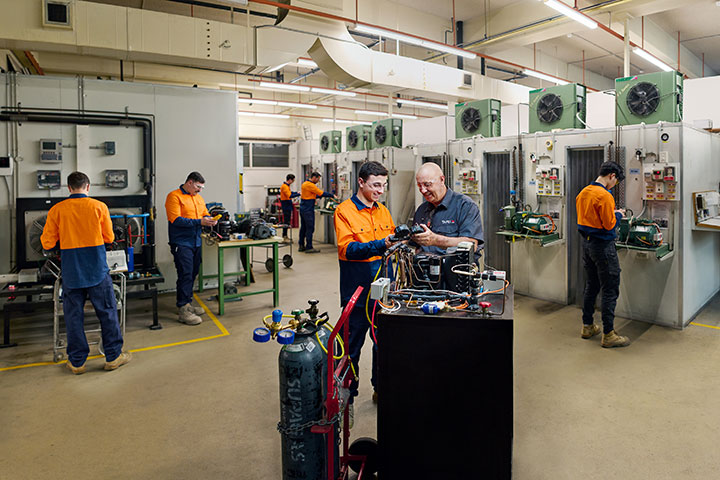- Go to homepage
- Course areas
- Building and Construction Trades
- Diploma of Air Conditioning and Refrigeration Engineering
Back to:Building and Construction Trades

OverviewAbout this course
Strengthen your Air-conditioning and Refrigeration experience and advance your career into roles such as project or field engineer. Gain high-level practical skills as you prepare for success in the industry.
OutcomesWhat you'll gain
Learning outcomes
Through a mixture of theory and practical course work, learn to:
Install, commission, service and maintain air conditioning and refrigeration systems
Maintain and diagnose faults and malfunctions
Use engineering applications software
Use and produce drawings, diagrams, schedules, standards, codes and specifications
Manage projects
Course outcomes
Gain practical experience and develop specialist skills that give you an advantage in the job market.
Advanced technical skills
Skills and knowledge to start your own business
SuitabilityIs this course right for you?
Entry requirements
This course requires evidence of previous experience or study before you can enrol.
Successful completion of a Certificate III in Air-conditioning and Refrigeration as evidenced by your academic transcript
A RAC01-Refrigerant Handling License as evidenced by a certified copy
Completion requirements
During your study you’ll need to provide your teacher with the following evidence:
Entry recommendations
To be prepared for this course, we recommend that you have:
Experience in software applications and with computer-aided drafting (CAD)
Experience in advanced testing and measuring instruments
You take charge of your learning and can finish tasks on time, by yourself.
You can read longer texts and understand their main ideas.
You can write longer paragraphs and texts that explain your ideas clearly.
You can join group talks and share your ideas clearly.
You can use maths to work out more detailed problems in different settings.
You can use digital tools to do everyday tasks like writing or finding info.
We tailor our courses to meet local community needs, so some campuses may have extra entry requirements. Check your preferred location for details. Need help preparing? Contact us for support.
Find Your Fit
This simple tool guides you to a suitable course level based on your foundation skills and confidence.
PathwaysFuture career and study options
Career pathways
Our graduates go onto roles like: air conditioning and refrigeration engineer, field engineer and paraprofessional in the heating, ventilation and air conditioning and refrigeration (HVAC&R) trades.
Licensing
A Refrigerant Handling Licence must be held by any person who carries out work in relation to refrigeration and air conditioning (RAC) equipment. Visit the Arctick (Australian Refrigeration Council) website for more information.
Study pathways
Take your study further with other courses offered at TAFE NSW:
Previous study1 Course
Begin here to gain experience and confidence in this study area.
Further study0 Courses
Advance your skills to take your career to the next level
The Diploma of Air Conditioning and Refrigeration Engineering does not have any post-graduate courses.
Related study0 Courses
Strengthen your expertise and gain specialist skills to expand your employability.
The Diploma of Air Conditioning and Refrigeration Engineering does not have any related courses.
Your experience counts
At TAFE NSW, we recognise your previous study and work experience. You can apply for recognition of prior learning or a credit transfer with any of our courses. If you're successful you'll get your qualification faster.
UnitsUnits taught in this course
Courses are made up of a combination of both core and specialty units. In the Diploma of Air Conditioning and Refrigeration Engineering qualification, you’ll need to successfully complete 1670 weighting points, including 1540 core and 130 speciality units.
Please note, not all specialty units are offered at every TAFE NSW location. It is highly recommended that you check with your preferred campus for information about the specialty units offered at that location.
Core units - 35
Core units are central to the job outcomes of a particular industry or occupation. These are the units industry has agreed are essential to be capable and qualified at a particular study level.
Use engineering applications software on personal computersUEECS0033
Verify functionality and compliance of refrigeration and air conditioning installationsUEERA0094
Analyse the psychrometric performance of HVAC/R systemsUEERA0002
Analyse the operation of HVAC air and hydronic systemsUEERA0001
- ... 9
TAFE NSW servicesFacilities and support
TAFE NSW provides support services across all campus locations and online. Whatever your needs or circumstances, we have the people, resources, counselling and facilities to support you in focusing on your studies.
TAFE NSW Disability Support Service
TAFE NSW Language, Literacy and Numeracy (LLN) support
TAFE NSW Aboriginal Support; Learner support (ABE)
TAFE NSW Careers, Counselling and Pathways Service
TAFE NSW Libraries
Scholarship programs - be supported as you explore your talents and fulfil your potential
Read&Write literacy and study support software is available free for all TAFE NSW students to use while studying on campus and at home
LinkedIn Learning - an online resource which offers innovative courses and tutorials to improve your personal and professional skills
Student associations - get social with our student community